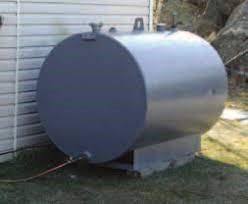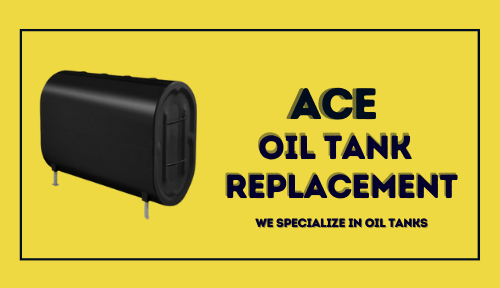How to Choose the Best Oil Tank Replacement Company in 2024
When budgeting for a new oil tank, understanding the replacement cost can help homeowners plan for a safer, more efficient heating solution.
Choosing the right oil tank replacement company is key for a smooth transition. In 2024, finding a reputable contractor is more important than ever. They should help you choose the best heating solution for your home.
Whether you need to replace an old tank or a new one, Ace Oil Tank Replacement (413-241-6720) is here to help. They offer a tailored experience that meets your specific needs.
At Ace Oil Tank Replacement, we know how vital it is to find a reliable company. Our team has the knowledge to guide you through the complex world of oil tanks. We ensure your choice is both good for your home and the environment.
Key Takeaways
- Partnering with a reputable oil tank replacement company is crucial for a smooth and cost-effective transition.
- Ace Oil Tank Replacement (413-241-6720) offers comprehensive expertise in oil tank replacement.
- Understanding tank types, replacement costs, and environmental regulations is essential when choosing the right contractor.
- Ace Oil Tank Replacement's team is dedicated to guiding you through the process and delivering exceptional service.
- The company's website (https://www.aceoiltankreplacement.com) provides valuable resources and information to help you make an informed decision.
Understanding Oil Tank Types and Replacement Needs
Choosing the right oil tank for your home affects your energy use, safety, and costs. Look out for signs your tank needs to be replaced to make a smart choice.
Above Ground Oil Tanks
Aboveground tanks are cheaper to install, costing $1,500 to $3,500 for a 275-gallon tank. They're also easier to check and fix.
Signs Your Oil Tank Needs Replacement
- Watch for signs your tank might need to be replaced. Look for:
- Rust or corrosion on the tank's surface
- Leaks or drips around the tank or fuel lines
- Decreased fuel efficiency or higher heating costs
- Age of the tank, with most lasting between 15 to 30 years
Common Tank Materials and Lifespans
Oil tanks are made from steel, fiberglass, or double-walled construction. Steel tanks last 15 to 20 years. Fiberglass tanks can last 30 to 50 years. Double-walled tanks, with an inner and outer shell, last 40 to 50 years.
| Tank Material | Average Lifespan | Cost Range |
|---|---|---|
| Steel | 15-20 years | $1,000 - $3,000 |
| Fiberglass | 30-50 years | $2,000 - $5,000 |
| Double-walled | 40-50 years | $3,000 - $6,000 |
Understanding oil tank types and when to replace them helps you choose wisely. Whether you're looking at aboveground oil tank installation price or oil tank removal cost, choose a reputable company like Ace Oil Tank Replacement. They ensure a safe and efficient fuel oil tank replacement.
Oil Tank Replacement Cost and Financial Considerations
Replacing your home's oil tank can be costly. The price depends on the tank's size, material, and location. On average, it costs between $1,500 and $3,500 in the United States. Larger or specialty tanks might cost more.
The type of tank greatly affects the cost. Above-ground tanks are cheaper, costing between $500 and $1,500.
There are ways to make replacing your propane tank more affordable. Many states and local governments offer rebates or tax credits. Oil and propane companies might also help with financing or payment plans.
| Tank Type | Average Replacement Cost |
|---|---|
| Above-ground | $500 - $1,500 |
When planning for an oil tank replacement, think about the long-term benefits. A more energy-efficient tank can save you money on fuel. This makes the initial cost worth it in the long run.
Essential Qualifications to Look for in Replacement Companies
Choosing the right company for commercial oil tank removal or residential oil tank replacement is key. When looking for a provider for your heating oil storage tank needs, here are the important qualifications to check:
Required Licenses and Certifications
It's vital to make sure the company is licensed and certified. Look for proof they have the right permits and credentials for commercial oil tank removal or residential oil tank replacement in your area. This includes state or local licenses and industry certifications.
Insurance Coverage and Liability Protection
Any good heating oil storage tank replacement company should have insurance. Check if they have liability insurance to protect you from accidents or damage. This ensures you're not responsible for any unexpected problems.
Experience and Track Record
Choose a company with a solid track record in commercial oil tank removal and residential oil tank replacement. Ask about their experience and ask for references from past clients. This will help you understand their work quality and customer service.
| Qualification | Importance | Example |
|---|---|---|
| Licenses and Certifications | Ensures legal compliance and professional expertise | State-issued permits, industry certifications (e.g., UST Removal, AST Installation) |
| Insurance Coverage | Protects you from liability and financial risk | General liability, worker's compensation, pollution liability insurance |
| Experience and Track Record | Demonstrates proven capabilities and customer satisfaction | Years in business, references from past clients, portfolio of successful projects |
By carefully checking Ace Oil Tank Replacement's (413-241-6720) qualifications, you can trust them to handle your commercial oil tank removal or residential oil tank replacement project. They will do it with professionalism and expertise.
Environmental Regulations and Compliance Standards
When dealing with oil tank abandonment, oil tank removal cost, and fuel oil tank replacement, knowing the rules is key. These rules are set by local, state, and federal agencies. They help keep our communities and the environment safe from oil tank problems.
Leaking or abandoned oil tanks can harm soil and groundwater. Strict rules require tanks to be removed and sites cleaned up properly. Breaking these rules can lead to big fines and harm to our environment.
Working with a trusted company like Ace Oil Tank Replacement (413-241-6720) is a smart move. Their team knows all about the rules and ensures your project follows them closely.
| Regulation | Key Requirements |
|---|---|
| State-Specific Regulations | Varied requirements for tank abandonment, removal, and environmental remediation |
| Local Ordinances | Permits, inspections, and additional guidelines set by municipal authorities |
Following these environmental rules ensures your oil tank abandonment, oil tank removal cost, or fuel oil tank replacement project is done right. It keeps your property safe and protects the environment around it.
The Tank Replacement Process: What to Expect
Replacing your heating oil or propane tank is a big project. But with the right help, it can go smoothly. Let's look at the main steps in replacing your tank.
Initial Assessment and Planning
First, you need to set up a meeting with a trusted tank replacement company, like Ace Oil Tank Replacement. Their experts will check your tank and suggest what you need. They'll also make sure it meets local rules. This step helps figure out the cost for your new tank.
Installation Timeline
After planning, the team starts the installation. Usually, it takes just one day to replace an oil or propane tank. The crew will remove the old tank and install the new one. They'll also connect it to your home's fuel system.
Post-Installation Inspections
After the tank is installed, the team checks it to make sure it works right. They'll test the tank, look for leaks, and check the fuel system. When they're done, you'll get a report and any needed papers.
Knowing what to expect makes the tank replacement process easier. Working with a good company ensures a smooth transition to your new tank.
| Service | Average Cost | Timeline |
|---|---|---|
| Aboveground Oil Tank Replacement | $1,500 - $3,500 | 1 day |
| Propane Tank Replacement | $500 - $2,000 | 1 day |
Comparing Quotes and Service Packages
Finding the right balance between cost and quality is key when replacing an oil tank. Look closely at the proposals from different companies. This way, you can find the best deal without sacrificing quality.
First, check the pricing details from each company. Look for clear, detailed pricing that includes everything. This should include tank removal, installation, and any cleanup needed. Make sure to compare the total costs and any extra fees that might add up.
Think about what extra services each company offers. This could be warranties, maintenance plans, or ongoing support. At Ace Oil Tank Replacement (https://www.aceoiltankreplacement.com, 413-241-6720), we focus on cost-effective solutions that last.
We've made a comparison chart to help you choose the right oil tank replacement provider:
| Factor | Ace Oil Tank Replacement |
|---|---|
| Total Project Cost | $4,900 |
| Warranty Coverage | 5 years |
| Maintenance Plans | Annual Inspection and Cleaning |
| Environmental Compliance | Exceeds Standards |
By comparing quotes and services, you can choose wisely. This ensures you get a good deal and peace of mind for years to come.
FAQ
What are the key factors to consider when choosing an oil tank replacement company?
When picking a company to replace your oil tank, look at their expertise, cost, and if they follow environmental rules. Make sure they have the right licenses, certifications, and insurance. This ensures your project is done right and safely.
What are the different types of oil tanks, and how do I know if my tank needs to be replaced?
Oil tanks can be above or below ground and are usually made of steel or plastic. If your tank shows rust, leaks, or is over 20-30 years old, it might need to be replaced. A professional should check your tank to see if it's time for a new one.
How much does it typically cost to replace an oil tank?
The cost to replace an oil tank varies. It depends on the tank's size, type, location, and if environmental cleanup is needed. On average, expect to pay $2,000 to $4,000 for an above-ground tank.
What qualifications should I look for in an oil tank replacement company?
When choosing a company, check if they have the right licenses, certifications, and insurance. They should be licensed for installation and removal, have liability insurance, and have a good track record in your area.
How do environmental regulations and compliance standards impact oil tank replacement?
Environmental rules are key in oil tank replacement. Companies must follow local, state, and federal laws. This ensures safe tank management and removal, protecting your property and the environment.
What can I expect during the oil tank replacement process?
The process includes an initial check, planning, installation, and inspections after. The company will help find the best solution for you, give a timeline, and make sure it's done right and safely.
How can I compare quotes and service packages from different oil tank replacement companies?
When comparing quotes, look at the total cost, services included, warranties, and the company's reputation. Understand the pricing and any extra fees that might come up during the project.


